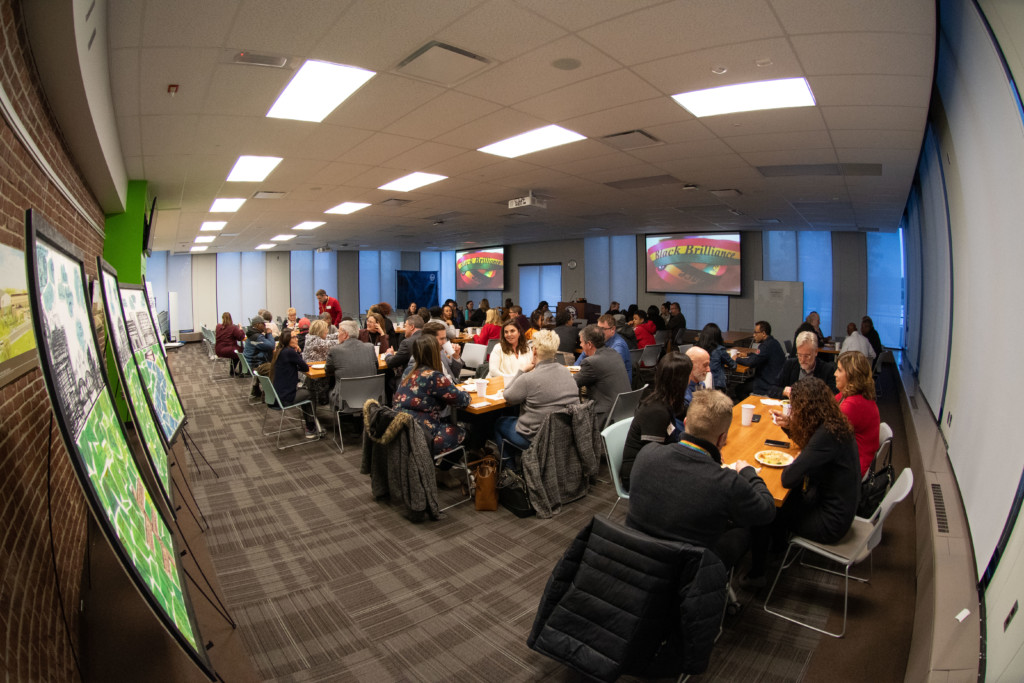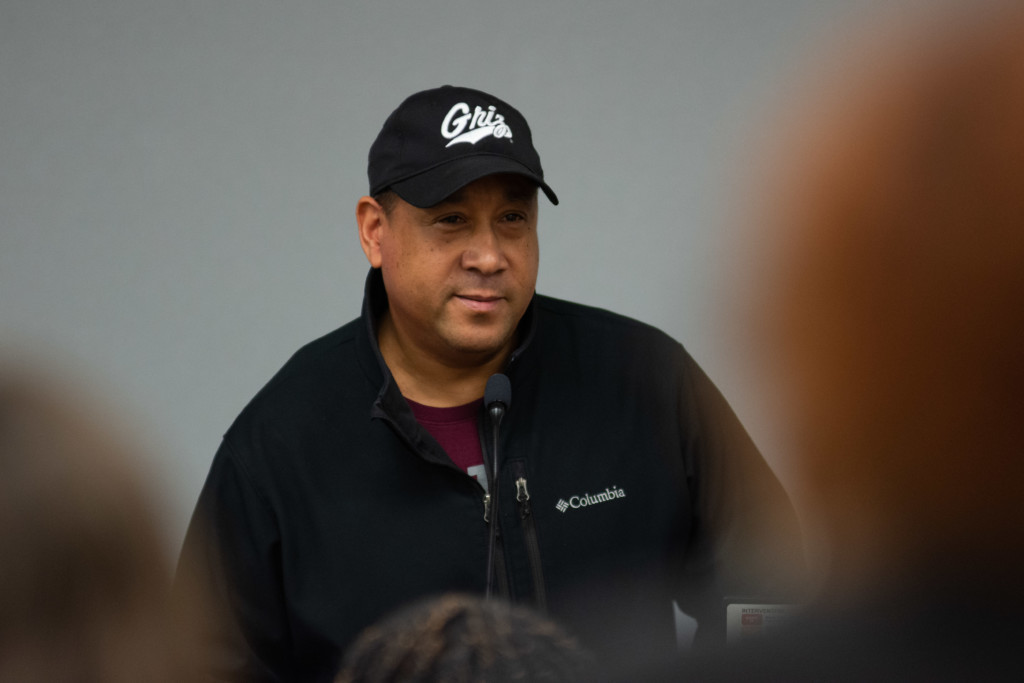March 5th, 2020
As the sun set on February 20, members of the community, along with staff and students from the Waterloo Region District School Board (WRDSB) gathered together at the Education Centre to mark Black History Month. This year’s theme sought to inspire attendees to think about the intersectionality that exists between Black and Indigenous experiences in Canada.
Sarion and Jaleel, Grade 12 and Grade 9 students, respectively, at Kitchener-Waterloo Collegiate and Vocational School (KCI), emceed the evening gathering, and explained why they felt this was an important event for any member of the community to attend.
“No matter the colour of your skin, you should come to this event,” said Jaleel.

For Jaleel, the event offers an opportunity for people of all backgrounds to come together and discuss issues that members of the African, Caribbean and Black communities are experiencing. As well, it offers an important chance for those that are not of African descent to learn about the culture and history, as this knowledge can help shape everyone’s perceptions and decision-making.
Sarion highlighted the significance of having educators and school administrators in attendance, as it demonstrates an investment in ensuring our classrooms and schools are truly places for each and every student.
“By attending this event, it’s really showing your students…that you care,” said Sarion. “That you care about your students, and you’re interested in learning about the concerns that they have and their history.”
John Bryant, director of education, was proud to welcome attendees to the event, but also wanted to share his understanding that there is still work to be done.
“I can’t help but reflect on the fact that this is only our second time hosting an event like this,” said Bryant. “I know we have a lot of work to do still, in terms of marking and celebrating Black History Month across our entire system.”
It’s Bryant’s hope that this event serves as a model to the entire WRDSB of the importance of recognizing Black History Month, and the many contributions of those from the African, Caribbean and Black community. Evidence that this approach is working can be seen in the growing number of Black History Month events being hosted in schools, as well as the annual Black Brilliance conference.

Events like these, Bryant explained, bring the issue of anti-Black racism to the forefront, and highlight our collective responsibility to address systemic racism, oppression and bias. As part of the effort to address this in the WRDSB, a Black Brilliance Advisory Committee has recently been established, with the goal of providing advice and feedback regarding the new Black Brilliance Strategy.
“This strategy was created in response to a greater understanding of how anti-Black racism is having a negative impact on the achievement and well-being of African, Caribbean and Black students,” said Bryant. “It solidifies our commitment to identify, address and eliminate the discrimination and marginalization that Black students may experience in WRDSB schools.”
He is confident this will help to empower school leaders, staff, students and community to come together and build a more equitable and inclusive learning environment for students – each and every one.
The keynote speaker for the evening, Curtis Bell, helped to inspire those in the audience in pursuit of this goal. Bell is the director of the 9 Heavens Healing Academy, a gang-exiting program for Toronto youth, and shared his family story, and his personal connection to Black History Month in Canada.

Bell began by talking about how there is a significant knowledge gap for many Canadians when it comes to understanding how much of Canadian history is Black history. He understands that for some, adjusting their view of history can be uncomfortable, but is necessary.
“We have to rewrite history, we have to relearn,” said Bell. “A lot of people are afraid to do that.”
Bell has a deep connection to Canadian history. “I’m very proud of my family,” said Bell, as he told the story of his grandfather William, who escaped slavery in the United States through the underground railroad. William later returned to the US to fight in the Civil War to abolish slavery.
There is much to cover when it comes to Black history, Bell explained, “but I’ve only been given a month.” One month alone is not enough time to even begin to scrape the surface of Black history in Canada, highlighting the need to ensure this history is included as part of every student’s education.
Bell knows the power education has, and believes it has an important role to play in addressing anti-Black racism in Canada. Including African studies, along with Indigenous studies, Bell explained, as part of the curriculum, would help all to have a better understanding of a more complete version of Canadian history.
“Until then,” said Bell, “we’ll be misunderstood, we’ll be stigmatized, we’ll be stereotyped, we’ll be divided.”
Bell’s message resonated with Jaleel, who gained an appreciation of how important it is to have a fulsome understanding of history, so it is not repeated. Taking a glance back in time, he sees echoes of the discrimination and barriers that his ancestors dealt with, in his life today. This signals there is still more work to be done.
“We can’t just move on, we have to acknowledge it,” said Jaleel. “It’s still happening today.”
Sarion explained she came away with a greater understanding of the intersectionality between the Black and Indigenous experiences in Canada, and “the struggles we both went through.” She hopes this event serves to foster relationships between members of these communities, and the WRDSB.
“It is our hope,” said Jaleel, “that this event afforded everyone the opportunity to learn something new, to engage in conversations with new people and to understand why Black history is so important in February, but also all year long,”
Celebrating Black History Month in the WRDSB
It’s a time to remember, learn and celebrate the contributions of Black people that have helped shape our past and future in Canada and around the world. Understanding their lived experiences helps build our own equity consciousness. Join the conversation on social media using the hashtag #BHMwrdsb.
Other Black History Month Stories
Tags: Black History Month · Education Centre

